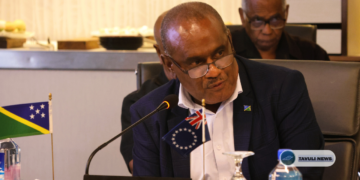CEO Pamela Naesol Calls for Immediate Government Action to Address Findings.
The Institute of Solomon Islands Accountants (ISIA) has raised serious concerns regarding the recent audit report on the economic stimulus package (ESP), which was implemented by the Solomon Islands Government in response to the anticipated negative economic fallout from the COVID-19 pandemic. The ESP, amounting to SBD 309 million, was designed to support businesses and households in maintaining production, trade, and employment, thereby boosting aggregate demand in the economy.
As the regulatory body overseeing the registration and conduct of accountants in the Solomon Islands, ISIA is troubled by the government’s apparent failure to comply with national laws, particularly the Public Finance Management Act and related regulations. The audit, which assessed the appropriated expenditure of the ESP in 2020 and 2021, aimed to determine whether the funds were spent in accordance with the approved guidelines set by the Cabinet and published on 6 May 2020.
Pamela Naesol, CEO of ISIA, expressed that the audit findings are alarming. “To lead is to serve,” she remarked, referencing the country’s motto. “Yet we observe that the government, which is entrusted with managing public finances, has bypassed financial laws and regulations that it is obligated to uphold.”
The Auditor General’s overview highlighted several critical issues, including a lack of legislative or procedural guidance for issuing grants at the scale involved with the ESP. Insufficient resources to adequately process thousands of applications also resulted in weaker internal controls. Delays in documentation, inadequate transparency regarding fund recipients, and potential instances of fraud were among the concerns raised. Notably, payments totaling over SBD 6 million were signed off by a single government official without documented authorization.
Naesol pointed out that the ISIA has consistently advocated for sound financial management practices, yet the government’s actions suggest a disregard for its own policies concerning public finance. She indicated that the issues arise when individuals lacking accounting expertise are placed in decision-making roles involving substantial amounts of public funds.
She emphasized the urgent need for the government to implement effective checks and balances within its ministries, emphasising the importance of appointing internal auditors in government departments to ensure proper oversight of public finances and maintain a reliable paper trail for auditing purposes.
“The economic stimulus package comprises contributions from taxpayers in the Solomon Islands, Australia, and other development partners. This report presents a serious concern regarding the government’s management of these funds,” Naesol stated. She called upon relevant authorities to take immediate action to address these breaches of public finance management practices, echoing the need for the government to strengthen payment and procurement processes.





![Chovohio [left] and Charivunga [right] confluence, to create a dam for sediment control](https://www.tavulinews.com.sb/wp-content/uploads/2025/04/Add-a-heading-43-360x180.png)







































































